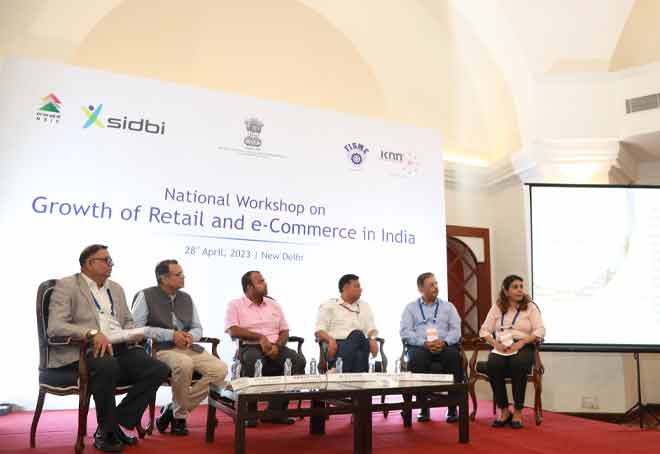India needs a healthy symbiotic relationship between Retail and E-commerce policies: FISME
Updated: May 01, 2023 02:52:02pm

India needs a healthy symbiotic relationship between Retail and E-commerce policies: FISME
New Delhi, May 1 (KNN) Federation of Indian Micro and Small and Medium Enterprises (FISME) has called for policy reforms to promote a healthy relationship through the Retail and E-commerce policies in India to create an environment for growth of MSMEs.
“The boundaries between physical retail and digital or e-commerce are blurring. MSME manufacturers and physical retailers are creating their e-presence and e-platforms are back-ending their physical presence. Indian policies need to nurture a symbiotic relationship between retail and e-commerce to help both retail and e-commerce grow,” says Anil Bhardwaj, Secretary General, FISME.
The MSME body recently hosted the “National Workshop on Growth of Retail & E-commerce in India” in New Delhi to identify the policy obstacles in the way of small businesses and retailers in joining digital retail and e-commerce.
Speaking at the event, Dr. Rajneesh, Additional Secretary & DC, MSME, Ministry of MSME said, “India is an aspirational country - we are on our way to becoming a USD 5 trillion economy and will soon also be USD10 trillion economy. This won't be possible by only relying on traditional ways of businesses. E-commerce is a disruptive force for unleashing the potential of MSMEs in India.”

“We, at the government, realise the relevance and importance of e-commerce. We are in line with the recommendations shared by FISME and the MSME representatives present today. We are committed to digitise businesses so that they can recognise the true value of e-commerce in growing their business and contributing to the economy at large,” he added.
The consultation was attended by delegates representing MSMEs, think tanks, payment service providers, e-commerce and last-mile delivery platforms, and industry organizations such as Amazon, Meesho, Zomato, BlinkIt, PayU, Shiprocket, among others.
This was aimed at providing constructive recommendations to the government on how offline and online channels can complement each other to embark on a new era for retail 4.0.
The consultation deep-dived into the reforms required for the integration of offline and online retail channels. With a paradigm shift in buying habits in the last 2 years, consumers, especially from tier 2 and tier 3 cities, have increasingly adopted e-commerce.
Several issues and concerns faced by MSMEs, retailers to set up businesses on e-commerce platform were discussed under expert guidance.
Challenges such as lack of parity between the regulatory requirements for online and offline sellers, burdening online sellers with additional compliance obligations were noted.
Some key recommendations tabled during the consultation include:
GST parity - One of the reasons for low digital penetration are the complex GST compliance requirements needed to make the transition from offline to online selling platforms. Presently, it is mandatory for online businesses to register under GST regardless of turnover.
However, for offline sellers, it only applies to businesses with a turnover of over Rs 40 lakhs. This creates an unequal playing field between offline and online retail.
MSME empowerment - MSMEs contribute almost 30% to the country’s GDP and play a critical role in making India a $5 trillion economy. In order to enable and empower them, provisions such as exemption from import duties on returns, inventory and order management support for new business, simpler funding options and subsidies for MSMEs, and efforts to drive awareness around digital marketing for new MSMEs, should be incorporated into policies.
Enabling e-commerce policy - The rapid digitization in India makes it crucial for MSMEs to make their business sustainable and resilient by leveraging e-commerce. There is a need for simpler and more enabling government policies for online businesses, removal of disparity between the regulatory requirements for online and offline sellers, and exemption of additional compliance obligations for online sellers.
Driving awareness – There is lack of awareness amongst MSMEs about the benefits of e-commerce platforms and the regulatory requirements for selling online. A favorable policy particularly for women entrepreneurs to increase their participation, a uniform e-commerce logistics policy that makes it easy for new MSMEs to reduce their transactional cost, driving awareness on the onboarding process and making the process easier, are some ways that will help small sellers. Additionally, an informational portal that serves as a one-stop-destination for regulatory policies will also help educate MSMEs.
(KNN Bureau)












